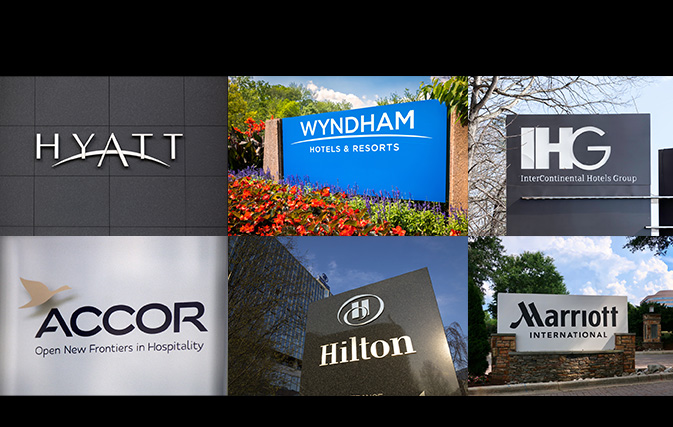TORONTO — There’s been much talk about how resorts and top-tier tourism destinations are managing COVID-19. Yet there has been relatively little discussion about how the ‘Big 6’ global hotel companies – IHG, Marriott, Hilton, Wyndham, Accor and Hyatt – are dealing with the crisis.
IHG, better known to many as InterContinental Hotels Group, has 16 brands with over 5,900 hotels. Marriott has 30+ brands with more than 7,000 properties. Hilton has 18 brands with more than 6,100 properties in its portfolio. Wyndham has 20 brands representing over 9,200 properties. Accor’s portfolio includes one of Canada’s favourites – Fairmont – along with more than 30 other brands encompassing more than 5,000 properties. Rounding out the Big 6 is Hyatt with its collection of 20 brands and more than 900 properties.
On the surface the Big 6 are implementing similar COVID-19 safety protocols. All have medical experts advising on best practices. Hilton, for example, has partnered with the Infection Prevention and Control Team at the Mayo Clinic. The others have partnered with organizations of similar credentials.
Big 6 hotel chain safety protocols generally include:
- All employees are required to wear masks
- All guests are required to wear masks in public areas unless they are eating or drinking (exceptions for guests with medical conditions)
- Extra sanitizing & disinfection of high-touch areas in guest rooms
- Increased cleaning frequency of public areas
- Disinfecting wipes available to guests
- Enhanced cleaning & disinfection of restaurant areas and meetings spaces
- Contactless check-in and check-out available at many properties
- Exploratory use of electrostatic sprayers with disinfecting mist and ultraviolet light to sanitize surfaces and objects
- Enhanced staff safety inclusive of personal protective equipment and enhanced training and protocols
While all of the above is designed to make potential travellers feel safe booking accommodation at well-known hotel chains, there are some common sense tips to keep in mind.
Big brands, especially big hotel brands, are known for consistency. Guests should be able to expect a common level of service and quality within a particular brand. Of course, the ownership structure of individual hotels makes this a bit more complicated. Some hotels are company-owned, some are owned locally and managed by the brand, some are managed by third party management companies and the majority are pure franchise properties.
Even in the best of times this means that adherence to brand standards varies among properties. All frequent travellers know this to be true. The hotel brands do their best to maintain consistent standards by using company inspectors as well as outside ‘secret shopper’ services. We mention this here as a cautionary measure. Just as COVID-19 has impacted leisure and normal business travellers, it has also impacted the ability of chains to police their ‘brand standards’. There’s nothing nefarious about this – it’s just one more way the pandemic has affected the hospitality industry.
The Big 6 hotel chains have not made public statements that they have relaxed their normal brand standards during the pandemic. Speaking confidentially with many hoteliers, however, more than a few told us that brand standards are relaxed.
Anecdotal remarks aside, relaxed brand standards is an issue that should be both anticipated and understandable as the Big 6 has to deal with the dual issues of COVID-19 travel restrictions on the personnel that carry out inspections and also supply issues that might occur due to pandemic shortages.
The astute travel advisor will also understand that while a hotel chain’s publicly stated COVID-19 policy is their well-intentioned goal, realistically the situation on the ground will show some variance. As such, it is best to advise travellers that their experience may vary from the stated brand policy.
In addition to the COVID-19 safety enhancements, each of the Big 6 promise both relaxed cancellation policies and paused expiration dates on loyalty program points.
As difficult as it is to cancel and change individual bookings due to COVID-19, many meeting & event planners have been experiencing issues where some properties are forcing these types of bookings to commit to specific future dates, or refusing to refund for cancelled meeting & events.
While the official policy of a large hotel chain may be that they understand the issues and are working with meeting planners to find acceptable alternatives, in reality that is not always the case.
Before entering into negotiations on changes or cancellations, the very first thing a meeting planner should do is re-read the applicable contracts, paying particular attention to any ‘force majeure’ clauses. A force majeure clause normally spells out what happens when a contract can not be executed due to unforeseen events. They can be very specific and on a legal basis they spell out the rights and privileges of both parties.
In the event that a contract does not have a force majeure clause, meeting planners probably do not have to rely on the goodwill of a property, as there are typically other legal protections that will come into play. Useful tips for negotiating meeting & event contracts with properties can be found on the PCMA (Professional Convention Management Association) website at www.PCMA.org.
As hotel protocols are changing in response to new information and guest preferences, here are links to each of the Big 6’s COVID-19 health & safety protocol pages:
Accor: https://all.accor.com/event/
Hilton: https://www.hilton.com/en/
Hyatt: https://www.hyatt.com/info/
InterContinental: https://www.ihgplc.com/en/
Marriott: https://news.marriott.com/
Michael Schoenberger is an aviation, hotel and travel industry expert and freelance travel writer.
